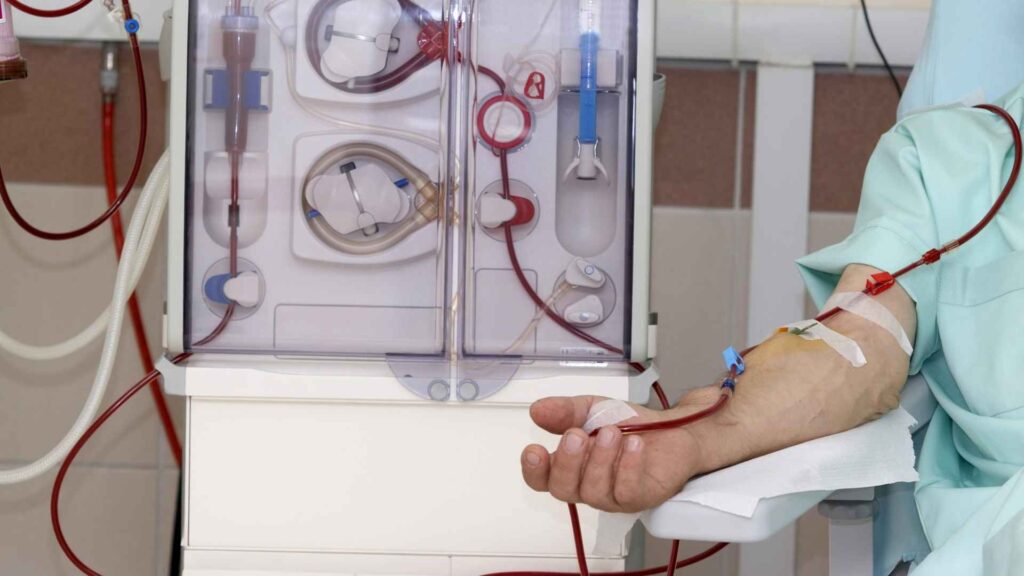What is hemodialysis
Hemodialysis is a medical procedure in which the kidneys are cleansed, and the blood is filtered of toxins and substances that can cause harm to the kidney. The kidneys act as filters for the blood because they filter the incoming blood from the body that carries impurities such as dead white cells, viruses, chemicals, pesticides, and much more. In a healthy person, the kidneys filter out all these impurities without any problems. However, in a person with kidney disease, the kidneys fail to filter the blood. Hence the blood becomes too full of toxins and impurities, which start affecting the kidney and other organs of the body. A good example of kidney disease-causing hemodialysis is when someone has a family history of kidney failure. In addition to this, people taking medications such as diuretics, antibiotics, chemotherapy, steroids, alcohol, and phenytoin drugs, are at high risks for developing hemodialysis. So if anyone in your family has been treated for any kidney disease or kidney failure, then you should seek immediate hemodialysis treatment so that your kidneys will be able to filter the blood easily. You can also take other measures such as increasing your fluid intake, taking some foods with plenty of fluids, and eating more protein-rich foods.How does hemodialysis work? How To choose Hemodialysis Center In Kolkata
What mechanism leads to the treatment and recovery of patients with kidney failure suffering from hematuria (an excess of the protein-filled fluid in the abdomen, specifically the blood)? Hematuria, or excess protein (which occurs in all patients with kidney failure), can be treated by dialysis, a process in which the machine removes this excess water through the use of tubes placed directly into the patient’s abdomen. The mechanism that leads to the recovery of patients from this situation usually takes place when the patient’s abdomen experiences a temperature rise. The increase in temperature caused by this dialysis device leads to removing the excess water through semi-permeable filters. This process can take place without causing any harm to the patient. Still, for this to occur, the dialysis device is set to a setting that allows for using only “friendly” bacteria to help combat this temperature rise.Can I have hemodialysis at home
Home kidney dialysis is administering dialysis to patients whose kidneys have not functioned normally at their homes, for people who do not want to undergo dialysis treatment in a medical facility. It can also be administered to people who do not have access to dialysis easily available and affordable dialysis machines. Dialysis at home can be done using a machine that dialysis machines use called a dialer. It can also be done using an ultrafiltration system or a variety of different mechanical devices. Home dialysis, also known as mobile dialysis, uses a different dialysis machine than a machine found in a medical facility. Home dialysis, also called outpatient dialysis or kidney oncology dialysis, uses a smaller dialysis machine called a micro blood pump. This dialysis machine can pump enough blood into the patient’s body so that their kidneys can work properly again. It is a great option for people who live in settings that do not have ready access to kidney failure transplant centers or dialysis centers. The best way to find out if you would like to receive home dialysis would be to talk to Kidney Transplant Physician In Kolkata about it. A doctor can tell you what you need to do to qualify for dialysis through your health insurance plan. In addition, they can also tell you which types of medical facilities might be able to offer you this type of dialysis treatment. Once you know whether or not you would be able to get this treatment through your health insurance plan, you can start looking for a hemodialysis center In Kolkata near you that can perform dialysis treatments.When To Go For Hemodialysis Center In Kolkata
The answer depends upon the type of kidney failure. End-stage renal disease (ESR) include a chronic metabolic syndrome and kidney transplant for failure to transplant kidneys. Hypertension or high blood pressure due to previous surgery for acute kidney injury (AKI), recurrent urinary retention (the condition where urine stays in the bladder longer than is usual for a normal person), chronic kidney failure (CKFS), where the kidney fails to replenish itself on its own, or due to damage to the kidneys including blockage of the arteries leading to the heart and lungs, and dialysis for obstructive sleep apnea are all types of kidney failures that require hemodialysis. The treatment consists of dialysis machines specially adapted for each type of kidney failure and dialysis nurse care to help patients with their particular problems. If one of the conditions is present, a blood sample is tested to see if the disease is progressing. Then a physician determines whether a dialysis machine is necessary. There are two types of dialysis machines: manual and automated. The type of dialysis machine that is used will depend upon the type of dialysis needed. If the patient is receiving outpatient and inpatient dialysis, two machines will be a portable dialysis machine and a permanent dialysis machine. Manual dialysis machines are generally considered more comfortable and easier to use, although some doctors prefer automated dialysis machines because they are more accurate. Portable dialysis machines are inexpensive, but portable dialysis machines have the same basic features as permanent dialysis machines. In either case, a person must have excellent health to be eligible for dialysis. Dialysis can be a lifelong commitment, but the good news is that there is a great prognosis for people who need dialysis treatments with modern advances. The type of equipment you will need when you go to the hospital, or the doctor’s office for your consultation depends on the type of dialysis machine. Some of the newer models require no filter, and you place the urine into the collecting cup. Other units will need an artificial kidney filter removed, and the urine goes into the collection cup. The type of hemodialysis machine that you ultimately decide to have will depend on your circumstances. If you are receiving kidney transplants, you may want to look into units that incorporate the use of an artificial kidney. Many dialysis patients across the country would greatly benefit from one of these new types of equipment. If you, or someone you know, consider having this procedure, you should take a few moments to look at the information contained in this special report. This report gives you all the basic facts surrounding the topic of dialysis and gives you a better understanding of what you can expect during the procedure and after it has been completed.Know Everything About Hemodialysis, Hemodialysis Center in Kolkata. How hemodialysis Works? When To Go For Hemodialysis ?How To Choose Best Hemodialysis Center In Kolkata ?

